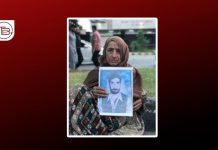Citizens, laborers, and students in Dukki and Quetta took to the streets on Friday in protest, demanding justice for the killing of nearly 20 coal miners in a brutal attack by unknown assailants late Thursday night. The incident, which took place in the Dukki district, has left the town in mourning as local residents, along with the bodies of the victims, stage a sit-in protest outside the Dukki FC Cantonment.
The attack occurred at coal mines located in the Junaid Coal Company area, about 8 to 10 kilometers from Dukki town. According to local police, a group of 30 to 40 heavily armed attackers targeted the living quarters of the coal miners, who were mostly resting after their shifts. The attackers used automatic weapons, rockets, and grenades, leading to the death of at least 20 miners, with many others injured, some critically.
The slain miners were mostly from Balochistan’s Pashtun-majority districts such as Zhob, Loralai, Pishin, and Quetta, while three were identified as Afghan nationals. The attack has sparked outrage, with many in the local community condemning the security forces for their failure to prevent such an incident despite being stationed only a kilometer away.
Eyewitnesses reported that the attack lasted for several hours, beginning around 11:30 PM and continuing until 2:00 AM. Local coal mine owners, including District Council Chairman Haji Khairullah Nasir, expressed their frustration with the lack of response from security forces, despite repeated calls for help during the attack. He revealed that armed assailants even used drones to locate miners hiding in nearby bushes, further highlighting the sophisticated nature of the attack.
Protesters, including grieving families and local schoolchildren, have marched through the streets of Dukki, chanting slogans against the government and security forces. They accuse the Frontier Corps (FC) of collecting millions in security fees from coal mines but failing to provide adequate protection for the workers. The protestors have vowed to continue their sit-in outside the FC Cantonment until they receive a response from the authorities.
Dukki police have pointed fingers at the Baloch Liberation Army (BLA), which has previously targeted coal trucks in the region, although no group has claimed responsibility for this attack so far. The assailants also set fire to coal extraction machinery, adding to the devastation.
Dr. Johar Khan Shadozai, Medical Superintendent of Dukki Civil Hospital, confirmed that many of the victims had multiple gunshot wounds to their heads and bodies, while others were injured by shrapnel from grenades. He described the brutality of the attack, with some miners having been shot multiple times, leading to their instant death.
The Afghan government has also condemned the attack, expressing sorrow for the loss of its citizens in the attack. Afghanistan’s Ministry of Foreign Affairs issued a statement calling on the Pakistani government to take necessary steps to prevent such incidents in the future. The Afghan Consulate in Quetta has been tasked with facilitating the repatriation of the bodies of the Afghan miners.
Local coal mine owners have been facing threats from various militant groups in the region for some time, according to Haji Khairullah Nasir. He revealed that several miners had been kidnapped in recent years, with only some being released. The insecurity has continued to grow despite the region producing 6,000 tons of coal daily, with coal mine owners paying substantial sums to security forces for protection.
This is not the first time coal miners in Balochistan have been targeted. In a similar attack a few years ago, at least seven miners from the Hazara community were brutally murdered, an act claimed by ISIS at the time.
The attack comes amid heightened tensions in Pakistan following a major operation by the Baloch Liberation Army (BLA) near Karachi’s Jinnah International Airport, which garnered significant international attention. It also coincides with the ongoing ‘Pashtun National Jirga,’ a major political gathering of the Pashtun people.
In previous periods of heightened tension, Pakistani intelligence agencies have been accused of orchestrating attacks to divert attention from key political events. However, the perpetrators of this attack remain unknown.
Dr. Mahrang Baloch, a leader of the Baloch Yakjehti Committee, condemned the Dukki attack on social media, describing it as a heartbreaking and violent act that highlights the growing lawlessness in Balochistan. She noted that the region’s instability disproportionately affects vulnerable workers and political activists, while security forces benefit from increased militarization and corruption.






























